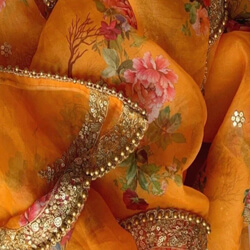Fiction:
She stood on the porch, her feet the level of my eyes, and looked down. I, scalp burned by the sun, looked up. A dupatta covered her head and face, save the eyes. The fabric hung across her sari like a hummingbird’s gorget. Two fingers rested against her throat, not looking for a pulse, but to keep the dupatta in place. In her other hand she held a children’s book, the index finger used as a place holder.
—Very soon, he will be home very soon.
—Should I wait?
A yes nod, a yes blink.
Behind me the water-taxi driver gunned the outboard and backed out of the sand. The open-hulled boat made a seaward arc and poked at the horizon, the pitch of the motor rising and falling with the waves He would return in an hour.
A drop of sweat rolled across the folded flesh of my midsection. Had I forgotten my briefcase? No. No, I had it. Hot sand grilled the soles of my Gucci loafers no socks thanks. What idiot wears Gucci loafers in the tropics?
The sensibly barefoot woman padded to the screened door and held it open. My overweight tested each step—ten in total. The porch floorboards creaked. The house wobbled on its stilts like a tipsy, box-shaped insect. I left the Guccis next to two pairs of child-sized sandals decorated with rubber-flowers. She took my wrist and led me from light to dark, to a teak-framed canvas sofa. Shafts of light from a slatted window colored the room and contents. The dead ceiling fan collected dust and cobwebs.
A child’s voice called from behind a thin wall. The woman showed me the book: The Lorax.
—Will you read?
I took the book and started to read.
—Not to me!
The dupatta fell to her shoulders. A smile escaped.
She led me through the kitchen and into a cramped bedroom. I lowered my bulk to the floor beside the bed mat, half-crossed legs, and read aloud words I hadn’t read for forty years. We sat knee-to-knee until I finished.
—What do you say to the nice man?
—Thank you.
The girl slept. The boy was awake, but ready to nap. The woman kissed each child on the forehead. We reversed our journey from the sofa.
—Would you like tea?
—Water, please.
She left and returned with the water. I drank too fast and burped loudly. This amused her.
—Will he be long?
—Very soon, he will be home very soon.
She removed a swollen album from the shelf, sat beside me, and placed the book on my lap. A fold of her sari fell away and bared her underarm and rib-rippled flank and a scent redolent of sex, maternity, and other markers of womanhood.
Her hand clasped the base of the album’s spine. She pointed at a yellowed-with-age photograph. My gaze followed the curve of her neck and jawline to the petaled flesh of her ear.
—Nani and Nana lived here. That’s grampa’s boat. Full of fish!!
—Good fishing?
—Not now. Here’s the dock and the big house where I grew up. That’s me! I was seven. The first time I jumped off the dock I was afraid.
—It looks high.
Her shoulders twitched. I spread my arms across the back sofa frame and looked at the moribund ceiling fan.
—It was nighttime! The moon was fat, ready to explode into a million stars. I was afraid that if I jumped, it would be the end of fish and sea and moon and stars. The end of everything beautiful—
—Did you?
—I dove! And a million stars rose from the sea.
At a photo of a cluster of stilt houses her expression darkened. My hand grazed her shoulder.
—No. That’s auntie’s house, my cousins . . . all gone.
Climate change and the tsunami had destroyed the village. People died, survivors moved on, and the government made plans for a wind farm that would fail before it started, but not before millions had been spent and stolen. I was collecting resettlement agreements. A head-of-household signature meant relocation and compensation. I asked without words this time.
—Very soon, he will be home very soon.
An outboard motor revved and went silent.
—Is that him?
—That’s the taxi. Do you have the paper?
I handed her the document and pen. She signed.
The tally of victims would never be complete.
We were done. Again, my overweight tested the steps. I forgot my shoes. The water-taxi driver waved. I looked up at the woman and wanted us to smile at each other. Two fingers rested on her neck. The dupatta covered her head and face, save the eyes.
A goodbye nod, a goodbye blink.
—Very soon, he will be home very soon.
Wayne Goss and his wonderful wife live in a modest home a block from the beach in Manzanita. He is the author of three books: Red Monkey, Clave, and How I Learned French or Certain Events in the Life of Otto Pulaski.


